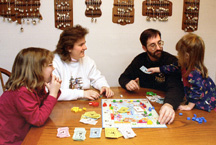 Purdue News
Purdue News
 Purdue News
Purdue News

|
The Links to Learning program educates parents on how the family contributes to children's learning. It emphasizes the use of parent-child conversations and activities as tools to improve children's problem-solving skills, which are key to adapting in a changing environment.
Links to Learning is aimed at parents of elementary-school children. "Most parent-education programs are concerned with preschoolers or adolescents," says Douglas Powell, head of Purdue's Department of Child Development and Family Studies. "However, studies point to the elementary school years as a key time to support the role of parents in children's learning."
The program uses a discussion-group approach, with a team of one parent and one professional facilitating discussions. Ten sessions are held at the children's school. Topics covered include how to prepare children for an uncertain future, how to stay connected to your children, and how parent's expectations set the stage for what children become. "Parents significantly influence how children think and learn," Powell says. "We tell parents, 'what you do, schools can't do.'"
Links to Learning is in its first year of widespread use, with facilitators trained from 60 schools across Indiana. Recently the program was introduced in Reno, Nev ., and Miami, Fla. The program underwent five years of research and testing with funding from Lilly Endowment Inc.
Powell says parents who took part in pilot tests in eight different communities in Indiana and Ohio overwhelmingly rated it as a positive program that should be continued.
"We found that as a result of Links to Learning, parents were engaging in more conversations with their children about school-related topics, they were more involved with their children's daily routines, and they strongly believed that good study habits and parental involvement were important contributions to children's academic achievement," Powell says.
One of the special contributions parents make is individual attention. "Parents are in a much better position than teachers to individualize conversations and activities to strengthen their child's unique talents and interests," Powell says. "And they can spend greater one-on-one time with a child in open-ended or spontaneous time, which isn't possible in schools."
Educators also like the program because it gets parents involved with the schools. At the Washoe County Schools in Reno, Nev ., grant coordinator Joanne Everts says it helps overcome a negative attitude on the part of some parents.
"So many parents have had bad experiences in their own education," she says. "Also, many of our families come from Mexico, and schools are scary places to them."
For the parents who participate, Powell says it's an empowering experience. "Parents feel like they can use all the help they can get when it comes to their children. Links to Learning shows them that they can build learning into the routine things they do every day."
For example, parent Peter Hill of Lafayette is participating in the program at Earhart Elementary School. He's learned of research that shows that open-ended questions are key to the development of strong thinking abilities, so he uses more open-ended questions with his three daughters. "Instead of asking if they had a good day, I'm asking them what happened at school," he says. "We've learned that they first have to remember things and prioritize them before telling us what happened."
At Earhart Elementary, about 40 parents are participating in the program each Monday night. "We offer a talent club for kids at the same time," says parent coordinator Linda Hagen. "That way we are promoting a family time and making it easier for parents to participate."
For information on how the program can be brought to your community, contact Powell at (765) 494-9511.
Source: Douglas Powell (765) 494-9511; e-mail, powelld@cdfs.cfs.purdue.edu
Joanne Everts (702) 348-0200
Linda Hagen (765) 449-0657
Writer: Beth Forbes, (765) 494-9723, e-mail, beth_forbes@purdue.edu
Purdue News Service: (765) 494-2096; e-mail, purduenews@purdue.edu
Photo Caption
The Hill family of Lafayette enjoys a game of Monopoly while discussing the day's
events. A Purdue program called Links to Learning is educating parents on the importance
of parent-child conversations and activities as tools to improve children's problem-solving skills. Seated from left to right are Brianna, Tammi, Peter and Lexi. (Purdue
News Service Photo by David Umberger)
Color photo, electronic transmission, and Web and ftp download available. Photo ID:
Powell/Links
Download here